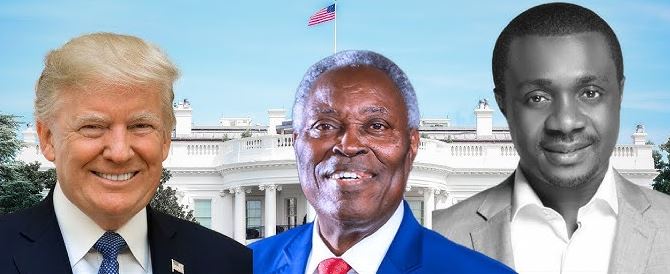Two high-profile Nigerian clerics took part in events surrounding the inauguration of US President Donald Trump on Monday.
The visits of Pastors William Kumuyi and Nathaniel Bassey served to underscore the ties between Christian evangelicalism and the incoming US administration.
Trump could leverage his popularity among some religious Christians on the African continent as an alternative way to boost his influence to the more traditional channels, an analyst has told the BBC.
Pastor Kumuyi was invited to Trump’s swearing-in ceremony though was unable to attend after the event was moved inside due to harsh weather.
Instead he spent time at a prayer service for the incoming president, as well as meeting political groups.
His invitation to the inauguration was unusual.
Although Trump broke tradition by inviting world leaders from countries including China, Italy and Argentina, there were no African heads of state on the guest list.
Outside of the official schedule, the well-known Nigerian gospel minister, Nathaniel Bassey, performed at the US Presidential Inaugural Prayer Breakfast on Monday morning.
The non-political, faith-based event was held ahead of the swearing-in ceremony, though it was not part of the official celebrations, and the president-elect did not attend.
Who is pastor Kumuyi?
A former maths professor, Pastor Kumuyi is the founder of Deeper Life Bible Church and the convener of the worldwide evangelistic ministry, the Global Crusade With Kumuyi.
The Global Crusade says its church has 120,000 attendees every week.
Having travelled to Washington DC, Pastor Kumuyi posted on X that he met congressmen from the powerful conservative youth group Turning Point USA to discuss how they can “partner together for global evangelism”.
On Sunday, he delivered a prayer at the Inauguration Praise & Prayer Convocation hosted by US pastor Jim Garlow and Tony Perkins from the Family Research Council, a US evangelical organisation.
Why were they there?
In a statement from the Global Crusade ministry, Pastor Kumuyi said he was participating in inauguration-related festivities to “celebrate a return to religious freedom in America and support for other nations in combatting religious persecution”.
Trump is popular with evangelical Christian voters in the US and has promised to uphold Christian values.
In 2019, during his first presidential term, Trump hosted the first meeting of foreign ministers focused solely on religious freedom. In a 2020 Executive Order, he wrote that “religious freedom for all people worldwide is a foreign policy priority of the United States”.
Dion Forster, professor of public theology at the Vrije Universiteit Amsterdam, says both Trump and Pastor Kumuyi will benefit from the Nigerian’s invitation to the inauguration.
He says Pastor Kumuyi can demonstrate that he is a friend to the most powerful man in the world.
For his part Trump and his team can use the pastor’s popularity to gain influence, the professor argues.
“The genius – and I hate to use that word – of the Trump political machine is that they really know how to work outside the traditional structures of national politics,” he says.
“Where [former President] Joe Biden would have set up connections with ambassadors, senior business leaders, Trump’s the kind of guy who asks ‘where does the power lie outside of those structures? And how can I bring those kinds of people closer to me?'”
Caleb Okereke, founder and editor of Minority Africa, agrees that the backing of popular religious figures like Pastors Kumuyi and Bassey could help Trump gain popular support on the African continent.
Mr Okereke believes shared political views unite US conservatives and African evangelists.
“There’s a marrying of global conservative ideals so I think Pastor Kumuyi and Pastor Nathaniel Bassey are only a small representation of what I think is a huge alignment between US politics and politics on the continent,” he says.
“I see them as a signifier of something that is much more entrenched, which is this agenda of aligning on the hatred of LGBTQ+ populations.”
However he believes there is a “cognitive dissonance” in Africa when it comes to Trump.
He points to the US president referring to African nations as “shithole countries” and restricting immigration from several states on the continent, including Nigeria, as part of a controversial travel ban during his first term.
“I am amazed at how much gender, sexuality almost blinds everybody to whatever else they’re saying,” he says.























